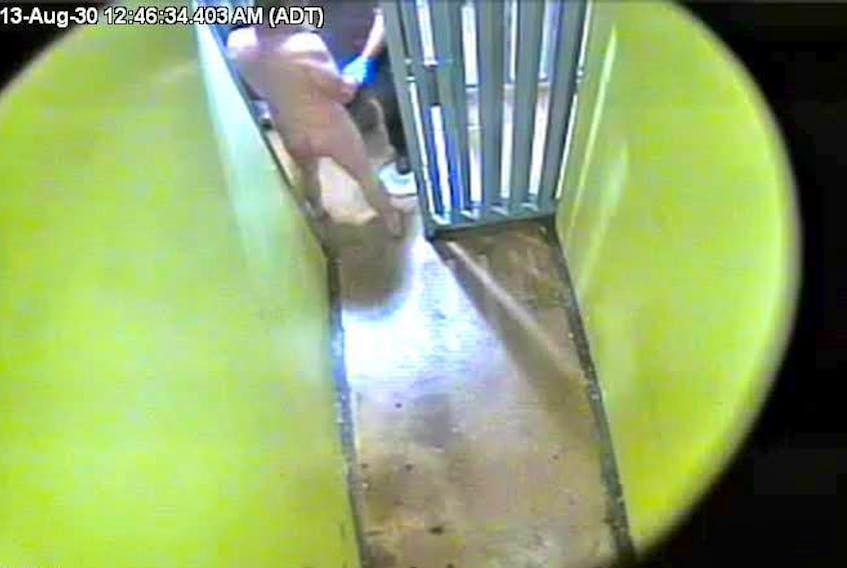“Halifax Police need to be held accountable, and I got a policy changed, to have smocks. But I’m hearing from other people that Halifax Police are not abiding by their policy.”
- Donald Smith
The man whose stay in a Halifax holding cell led to a new policy on how drunks are treated says the policy isn’t being followed.
Donald Smith spent time in the drunk tank naked and in a pool of his own urine after police told him to remove his clothing.
His formal complaint in 2013 caused police to start issuing safety smocks to people who could potentially use their clothing to harm themselves, instead of leaving them naked.
“I filed a complaint, posted the images online and I got a policy changed about how people are treated, so if they’re dealing with suicide they have smocks, baby doll dresses,” Smith said from Vancouver, where he now lives. “And I’m hearing from other people the policy’s not being upheld properly.”
Smith called The Chronicle-Herald after he read Wednesday’s story about a police review board hearing into the death of Corey Rogers, who died in police custody in 2016. Three police officers were suspended for eight to 10 days for their roles in that incident, while two special constables face criminal charges.
“I don’t know Corey, I don’t know Jeannette (Rogers’ mother), but nobody from Halifax apologized to me, no lawyer contacted me, no one contacted me,” Smith said. “That could’ve been me in that cell. And I want to know if Corey had mental health issues, I want to know what was going through his head, because Halifax Police don’t have proper mental health training. And they don’t have body cameras. I’m glad those two special constables are being charged, but the nine-day suspension, and the 10-day suspension and the eight days? Hell, no! Those cops need to be off the police force. This stuff needs to stop.
“They should be charged with murder, and be suspended, be held accountable like other citizens (would be). Because the Police Acts protects these people and it’s sickening what I have to see every day.”
Smith said he’s been hearing from people in Halifax, whom he didn’t identify, that have been in the drunk tank, stripped of their clothing but not given smocks.

“Halifax Police need to be held accountable, and I got a policy changed, to have smocks. But I’m hearing from other people that Halifax Police are not abiding by their policy,” he said. “I just hear it on the grapevine, from people from Halifax, who’ve (gone through) similar situations. I’m not going to name names, but I just hear it from sources in Halifax. It’s very disgusting how Halifax Regional Police are still doing it, treating people who are intoxicated.”
The Chronicle Herald asked HRP to comment on Smith’s accusations and Const. John MacLeod emailed a statement.
“... we do have a policy in place in regards to persons brought to our Prisoner Care Facility that need to have their clothing removed for their safety. That policy is adhered to by our officers.”
Smith, 39, who admits to having mental health issues, has also spent time in drunk tanks in Vancouver and Nanaimo, B.C. He also filed complaints against police departments in those cities.
“I was stripped down naked and I have pictures of it,” he said of his encounter with Nanaimo police. “It took me two years to get the pictures, and I’m trying to get the ones of Vancouver.”
Wayne MacKay, professor emeritus at the Schulich School of Law at Dalhousie, said he would like to be able to believe the police when they say they are following their policy when it comes to dealing with severely intoxicated people.
“But it’s kind of unfortunate that they didn’t elaborate a little bit more than a one-sentence response. It’s one of those tricky situations but in an important manner like this, we should be entitled to believe what the police tell us; the reality is that is not always correct and, given that, it would have been preferable if they had elaborated more,” said MacKay, who thinks body cameras would be helpful in proving what the police claim.
“Obviously they have to be turned on, they have to catch the right thing, they’re not the absolute magic bullet that sometimes people think they are, and do have some down sides in terms of costs and other things. But it would be at least an additional piece of information where it is one of those direct conflicts, where he’s saying one thing and they’re saying something else.”
RELATED: Police review board appeal adjourned in Halifax cell death case









